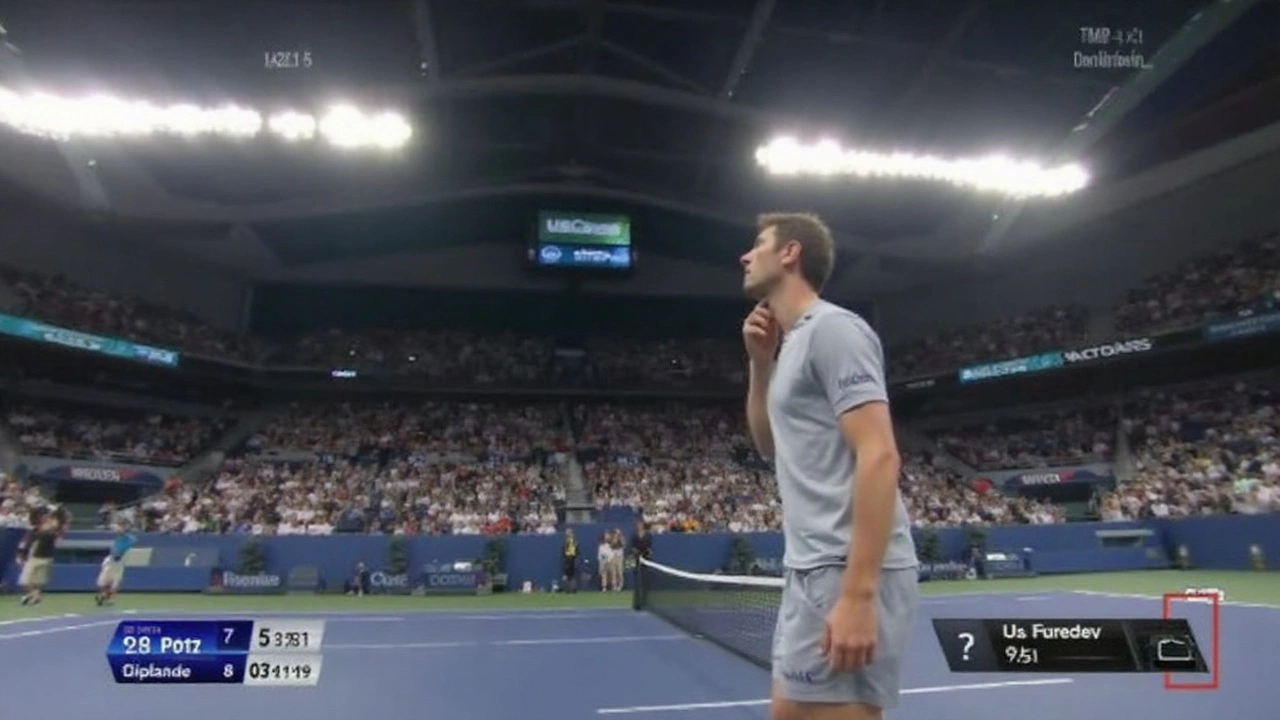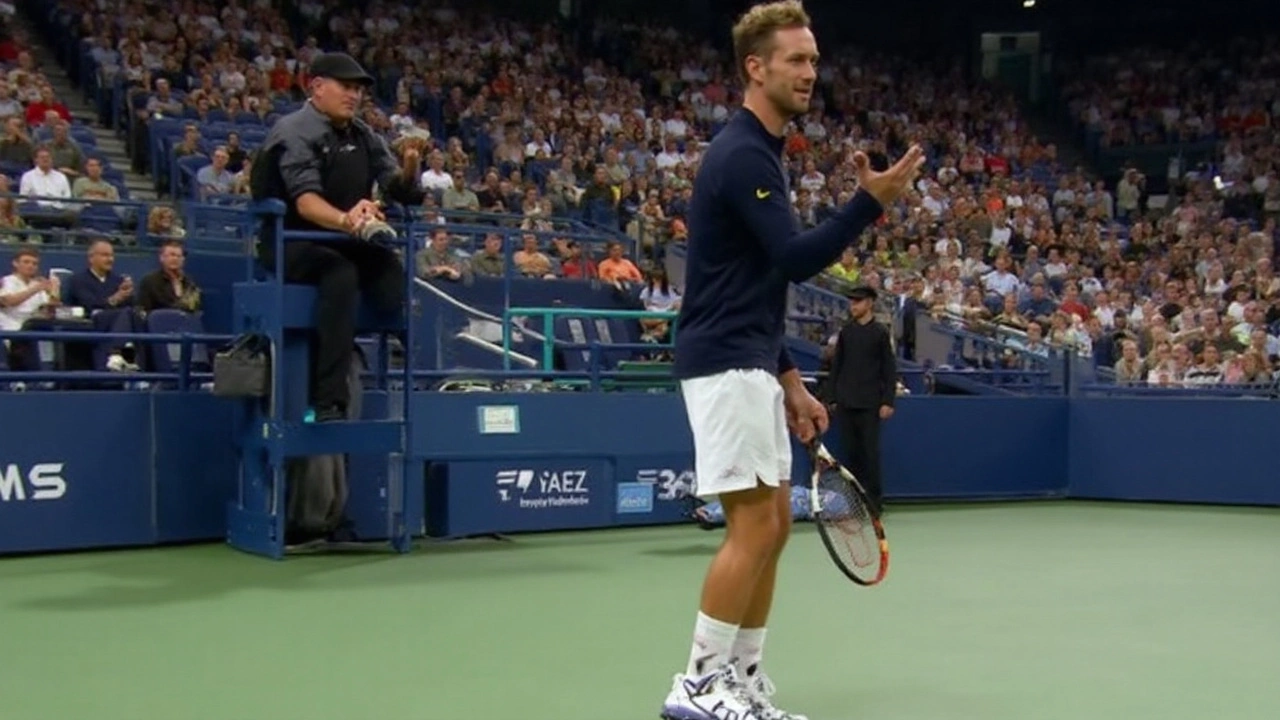Daniil Medvedev meltdown after US Open 2025 five-set loss to Bonzi sparks umpire row
A five-set swing that defied logic
Daniil Medvedev walked into New York as a former champion and walked out on Day 1, beaten, furious, and minus a racket. The 2021 US Open winner fell to France's Benjamin Bonzi in a five-set street fight that stretched to 3 hours 45 minutes: 6-3, 7-5, 6-7(5), 0-6, 6-4. It was the kind of match that flips three times and still finds a new twist.
The opening two sets belonged to Bonzi, who kept his nerve in the tight moments and picked off short balls with clean, measured hitting. Medvedev, usually the metronome of hard courts, leaked errors early and struggled to find a first-serve rhythm. Bonzi’s control in rallies put constant pressure on the Russian’s service games, and when he needed small bursts—at 5-5 in the second set, for instance—he found them.
Then everything tilted. Serving to stay in the match in the third-set tiebreak, Medvedev saved a match point and snatched the breaker 7-5. That survival shot jolted the match awake. The fourth set was a rout: 6-0 to Medvedev. He stepped inside returns, redirected pace, and turned Bonzi’s patterns back on him. The Frenchman’s forehand depth dipped, and Medvedev pounced on anything short, sprinting through the set in a blur.
Into the fifth, the mood tightened. Bonzi regrouped—no panic, no flinch—and went back to percentage tennis. He took the air out of rallies, protected his serve with first-ball accuracy, and forced Medvedev to press. One service break decided it. Bonzi held steady when it mattered most, closing with efficient patterns rather than hero shots.
Scorelines tell the shape of a match; this one told three. Bonzi built it, Medvedev blew it open, Bonzi sealed it. For a first-rounder, it felt like the tail end of a second week.

The flashpoint and the fallout
The turning point everyone will debate didn’t change the score immediately—but it clearly changed the temperature. In the deciding set, a photographer stepped onto the court as Bonzi prepared to serve. The chair umpire allowed a first-serve do-over. Medvedev exploded, arguing that the interruption at such a tight moment broke the flow and favored the server.
Here’s the context. Under the rules, outside interference—like a person entering the playing area—can trigger a replay. The chair has discretion to call a let and, depending on timing, restore a first serve. It is not rare. What made this messy was the moment: late in a fifth set, tension high, a fragile rhythm on both sides. Medvedev, who thrives on tempo and patterns, felt the reset sliced into his momentum. He addressed the chair repeatedly, and play resumed with visible friction.
From there, Bonzi kept his head. He moved his serve placements, stayed disciplined with depth, and made Medvedev hit one more ball. The Russian chased, looked for quick court, and missed by inches. When the handshake came, it was brief. Then came the scene that will dominate social media: the smashed racket.
Medvedev slammed his stick into the hard court—repeatedly—until it splintered, drawing a stunned murmur from the crowd. Officials stepped in as he continued to vent, and after a delay, escorted him off when he didn’t leave straight away. For a player known for calculated chaos and dark humor with New York crowds, this was something else: raw, unguarded frustration.
Expect consequences. Racket abuse and unsportsmanlike conduct typically bring fines at majors, and the tournament can review behavior after the final point. Whether the outburst stops at a monetary penalty or prompts a deeper conversation about code enforcement will depend on the officials’ report. Either way, the optics are tough: a former champion losing control after clawing back from the edge.
Strip away the drama, and the tennis mattered. Bonzi deserved the win. He weathered the storm of a bagel set, a saved match point turned against him, and the ambient noise of a contentious call. He defended his service games in the fifth, risk-managed on return, and didn’t overhit. That composure is how underdogs pull off shockers at Slams—by keeping the floor high when the favorite is swinging for the ceiling.
For Medvedev, the questions are tactical and mental. Tactically, his return position fluctuated all night, sometimes deep, sometimes on the baseline. When he stepped in, he won more short exchanges; when he drifted back without depth, Bonzi took time away. Mentally, he rode an emotional rollercoaster: from flat, to defiant, to incandescent. The third-set escape and fourth-set blitz were reminders of his ceiling. The fifth revealed how thin the margin is when focus frays.
A note on the umpire dispute: players have a long memory for these moments. Even if the ruling sits within the rulebook, the timing can stick like a splinter. The best response is usually channeling it into the next return game. Medvedev, in the aftermath, let the grievance expand. Bonzi kept shrinking the court with basics: first serves in, neutral balls deep, no angles offered until the opening appeared.
The result lands hard in the broader tournament picture. A former champion gone on Day 1 removes a proven hard-court closer from the draw and reshapes that section for opportunists. It also hands Bonzi the kind of confidence bump that can carry through a week—especially after surviving a match that swerved violently. He didn’t just beat a big name; he outlasted a surge that flattens most players.
What comes next for both?
- For Bonzi: recovery and reset. Five sets in New York humidity test the legs, but the game plan—high-percentage depth, smart serving—travels. If he keeps the unforced errors low and manages scoreboard pressure, he’s dangerous in round two.
- For Medvedev: a reboot. The raw game is still there—return instincts, redirecting pace, defensive reads. The work is emotional management under stress and recommitting to patterns that win without the drama. Expect a statement week at his next event; he tends to answer loudly.
Flushing Meadows crowds love edge, and Medvedev has made a career out of playing right up to it. On this night, he stepped over. Bonzi, calm amid the noise, stepped through to the next round. The score will sit on the draw sheet like any other number. The image—racket in pieces, a former champion staring at splinters—will linger longer.





